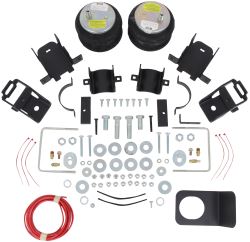
Rear Suspension Enhancement System for a 2000 Ford F-250 4x4 Towing Gooseneck Trailer
Question:
I have a Ford F-250 3/4 ton 4x4 with the 7.3L Diesel motor. Yes, lucky enough to have one of the last of the great Ford motors. I have a 32foot Gooseneck Ball-in-Bed Horse Trailer that weighs 10000 total. Obviously the tongue/bed weight is not that. When I put horses in it the max. weight of the total trailer would be appx. 13000 lbs. I believe but Im not sure, that the truck is equipped with heavy duty rear springs. PROBLEM: The truck squats in the rear when the trailer is hooked up. What is the best product that you could recommend to fix this problem?
asked by: Julie
Expert Reply:
The best rear suspension enhancement product for your 2000 Ford F-250 is going to depend on a couple things. First, how your gooseneck hitch is attached to the frame of your truck and second, whether you prefer adjustable air springs or fixed rubber springs.
For an air spring system, I recommend installing the Firestone Ride-Rite Air Helper Springs, # F2550, that you referenced. This system is compatible with most gooseneck and fifth wheel hitches and have been tested for up to 5,000 lbs which should be more than enough to support the tongue weight of your trailer. To determine if this kit will work with your gooseneck hitch, you will want to look at the frame brackets for your gooseneck hitch to see if the brackets block the hole in the frame rail just above the axles (see photo).
If the frame brackets for your hitch do block that hole, then I recommend looking at a rubber spring system like the Timbren Rear Suspension Enhancement, # TFR150SDE. These springs will replace your existing bump stops on the bottom of the frame rail and have been tested to support up to 10,000 lbs, which again, is more than enough to support your trailers tongue weight.
Both of these systems will work with factory top overload springs and do not require any drilling to install. You should keep in mind that these systems will not increase the weight-carrying capacity of your truck so you will want to make sure you do not exceed Fords recommended weight limit for your truck.

Products Referenced in This Question
Timbren Rear Suspension Enhancement System
- Vehicle Suspension
- Rear Axle Suspension Enhancement
- Jounce-Style Springs
- Extra Heavy Duty
- Timbren
more information >
Product Page this Question was Asked From
Firestone Ride-Rite Air Helper Springs - Double Convoluted - Rear Axle
- Vehicle Suspension
- Rear Axle Suspension Enhancement
- Air Springs
- Heavy Duty
- Firestone
more information >
Featured Help Information
Instructions

Continue Researching
- Shop: Timbren Rear Suspension Enhancement System
- Shop: B&W Companion Gooseneck-to-5th-Wheel Trailer Hitch Adapter - Dual Jaw - 20,000 lbs
- Shop: Firestone Ride-Rite Air Helper Springs - Double Convoluted - Rear Axle
- Shop: Trailer Wiring
- Shop: Suspension Enhancement
- Shop: B&W Turnoverball Underbed Gooseneck Trailer Hitch w/ Custom Installation Kit - 30,000 lbs
- Shop: Gooseneck Hitch
- Article: Brake Controller 7- and 4-Way Installation Kit (ETBC7)
- Video: Choosing the Right Trailer Wiring
- Shop: Trailer Hitch
- Search Results: 44649
- Shop: 7- and 4-Pole Trailer Connector Socket w/ Mounting Bracket - Vehicle End
- Q&A: What is the Difference Between a 4-Way and 7-Way Trailer Connector
- Article: Trailer Wiring Diagrams
- Search Results: 25580
- Shop: Fifth Wheel Hitch
- Shop: Tekonsha Prodigy P3 Trailer Brake Controller - 1 to 4 Axles - Proportional
- Q&A: What is the Difference Between a Class II and a Class III Hitch?
- Q&A: Recommended Lithium Battery Compatible Power Converter For Parallax 7355
- Search Results: 68149
- Video: Choosing the Right Brake Controller
- Shop: Brake Controller
- Shop: Curt Powered Tail Light Converter with 4-Pole Flat Trailer Connector
- Search Results: dust cap
- Q&A: Replacement 5 Leaf Slipper Spring for a Tandem Axle Dump Trailer with Two 6K Axles
- Article: Brake Controller Installation: Starting from Scratch
- Video: Air Lift LoadLifter 5000 Ultimate Rear Air Helper Springs with Internal Jounce Bumpers Review
- Shop: Base Plate for Tow Bar
- Search Results: equalizer
- Q&A: Seal With Dimensions to Replace 171255UC


























